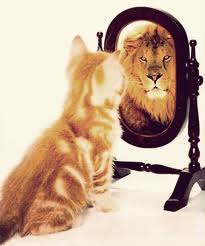
Within the next few years, this sweet little girl may change. She may believe being smart is not cool so she will pretend she is not. She may believe being creative makes her different, so she will hide it. She may believe assertiveness does not go over well with the boys so she will learn to become passive. She may see the TV and the magazines and believe that all “pretty girls” come in one size…skinny. There may come a day when she does not see herself as fabulous anymore, because she will be so focused on her flaws. Her confidence may turn to doubt.
I know I’m generalizing here, but I see this phenomenon every day…in my young students, in my own daughter, and even in myself. In an article on babycenter.com, Chris Woolston says, “Girls usually start off life at full steam. They're the early talkers, the social butterflies, the A students. But somewhere between preschool and middle school, a confusing blend of new social pressures, greater expectations in the classroom, and mixed signals from society (“Do your best – but don’t draw too
much attention to yourself,” “You can be anything you want to be – but looking
pretty is your top priority”) can cause girls to fall behind academically or lose their spark.” Check out an issue of any magazine marketed to women out there and you will be stunned by the mixed signals we are sending our young girls. Anita Gurian, PhD states in an article on aboutourkids.org that, “Starting in the preteen years, there is a shift in focus; for girls, their appearance and their changing bodies too often become an all-consuming passion and barometer of worth. For an overwhelming majority of girls, self-esteem becomes too closely tied to how they look and their physical attributes; girls feel they can't measure up to unrealistic society standards.”
After watching a couple more videos, my friend looked at me and said “What do I do? How do I keep her thinking she is fabulous?” She was asking me not only as a counselor, but as a friend and as a mother of a 14 year-old girl. I wish I had THE answer. I don’t. I struggle with this same question. I do like this list from the Chris Woolston article of things you can do to build your daughter's confidence and resilience for the tricky years ahead:
1. Encourage assertiveness…Teach your daughter to express her needs to adults and stand her ground with her peers. If another child is being mean to her, encourage her to say "I don't like the way you're talking to me."
2. Be specific in your compliments…When you tell your daughter how smart she is, it means much more if you use concrete examples. Tell her "You have a really good memory" or "Boy, you sure know your dinosaurs."
3. Make your praise match reality…A third-grader will know that she's not a musical genius or the best artist on the planet, but she'll appreciate it if you notice her improvement from one month to the next.
4. Help her understand why she sometimes gets left out…Explain to your daughter that if she isn't invited to every birthday party or to join every jump-rope game (and she won't be), it's not meant to be an insult. Explain that when another child says "You can't be my friend," it probably has more to do with that child's bad mood than it does with your daughter.
5. Encourage competence…Don't be too quick to help your daughter with homework or chores. If she asks for help, ask her to try working through it for a couple more minutes on her own first.
6. Encourage her to play sports if she wants to…Girls have more sporty options than ever before. If she wants to do gymnastics or play football, give her a chance to get in the game and find out what she's capable of. Don't decide which sports are right for her – she can figure it out herself.
7. Don't make assumptions about her strengths and weaknesses…Just because your child is a girl doesn't mean she'll struggle with fractions – or that she'll ace reading tests. It also doesn't mean she won't want to go fishing or try out for Little League. Follow her cues to best nurture her strengths and work on improving her weaknesses.
8. Encourage a healthy body image…When she asks the inevitable "Am I pretty?" answer her with an enthusiastic yes. When you praise her appearance, try to highlight her actions, too: "You looked so graceful at gymnastics today" or "Your eyes really shone on the stage.” It can also be helpful for older girls to hear that models in magazines don't look like real girls or women and that their photographs are altered to make them look thinner and more flawless than they actually are.
9. Prepare her for sexism…Even today, some people think that girls can't do some things that boys can. If you notice your daughter watching TV shows or movies where girls stay in the background while boys save the day, point it out and talk to her about how different things are in the real world.
10. Point out positive female role models…Take every opportunity, when you're watching the news or reading the paper, to show your daughter that women - senators, sportscasters, doctors, athletes – can do anything. Reading books with strong female characters is one of the best ways to get the idea across without
lecturing. If you can't think of enough books like that, ask a librarian – they often have lists of books to choose from and can make recommendations.
Do you agree with his list? What would you add? What’s worked for you? Check out this video from The Dove Campaign for Real Beauty...
 RSS Feed
RSS Feed
